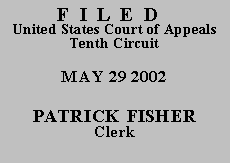 UNITED STATES COURT OF APPEALS
UNITED STATES COURT OF APPEALS
 UNITED STATES COURT OF APPEALS
UNITED STATES COURT OF APPEALS
TENTH CIRCUIT
| UNITED STATES OF AMERICA, | |
| Plaintiff - Appellee, | |
| v. | |
| RICARDO LACAYO-GARCIA, also known as Edvin Ajanel-Huox, also known as Richardo Ramirez, also known as Jose Rafael-Lopez, | |
| Defendant - Appellant. |
Mr. Lacayo-Garcia is appealing his sentence of seventy-seven months of imprisonment imposed for Illegal Reentry of a Deported Alien in violation of 18 U.S.C. § 1326. Appellant claims that 1) the sentence imposed was excessive and disproportionate in violation of the Eighth Amendment of the United States Constitution,(1) and 2) the district court erred in sentencing Appellant to a term of imprisonment that exceeded the maximum penalty for the offense of conviction.
Appellant's first contention is that his sentence violates the Eighth Amendment because it is excessive and disproportionate to the crime Appellant committed. We have carefully reviewed the briefs, the district court's disposition, and the record on appeal, and we hold that Appellant's sentence does not violate the Eighth Amendment because seventy-seven months of imprisonment is not disproportionate to the crime of illegal reentry by a deported aggravated felon. See, e.g., United States v. Silva-Solorzano, No. 99-4078, 2000 WL 16325 (10th Cir. Jan. 11, 2000) (affirming seventy-month sentence); United States v. Villegas-Viscaino, No. 94-2084, 1995 WL 72364 (10th Cir. Feb. 22, 1995) (affirming sixty-six-month sentence).
Appellant next claims that the district court erred in sentencing him to a term of imprisonment that exceeded the maximum penalty for the offense of conviction. The United States did not allege Appellant's prior aggravated felony conviction in the indictment. However, the district court enhanced Appellant's sentence based on this prior conviction.
Appellant's argument is foreclosed both by the Supreme Court and this circuit. In Almendarez-Torres v. United States, 523 U.S. 224, 247 (1998), the Supreme Court ruled that an indictment need not allege a defendant's prior felony conviction in order for a district court to enhance his sentence pursuant to 8 U.S.C. § 1326(b)(2). Appellant relies on Apprendi v. New Jersey, 530 U.S. 466, 489-90 (2000), where the Supreme Court called into question the validity of Almendarez-Torres. We have previously held that the Apprendi decision did not overrule the Supreme Court's holding in Almendarez-Torres. See United States v. Martinez-Villalva, 232 F.3d 1329, 1331-32 (10th Cir. 2000).
We AFFIRM.
Entered for the Court
Monroe G. McKay
Circuit Judge
*. This order and judgment is not binding precedent, except under the doctrines of law of the case, res judicata, and collateral estoppel. The court generally disfavors the citation of orders and judgments; nevertheless, an order and judgment may be cited under the terms and conditions of 10th Cir. R. 36.3.
1. Appellant's statement of the issues asserts that his Fifth Amendment rights were also violated but he failed to develop this argument in his brief. Therefore, we analyze his argument only pursuant to the Eighth Amendment.